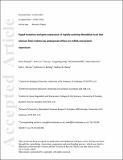Rapid evolution and gene expression : a rapidly-evolving Mendelian trait that silences field crickets has widespread effects on mRNA and protein expression
Date
06/2016Author
Grant ID
Ne/I027800/1
NE/G014906/1
NE/L011255/1
094476/Z/10/Z
Keywords
Metadata
Show full item recordAbstract
A major advance in modern evolutionary biology is the ability to start linking phenotypic evolution in the wild with genomic changes that underlie that evolution. We capitalised on a rapidly-evolving Hawaiian population of crickets (Teleogryllus oceanicus) to test hypotheses about the genomic consequences of a recent Mendelian mutation of large effect which disrupts the development of sound-producing structures on male forewings. The resulting silent phenotype, flatwing, persists because of natural selection imposed by an acoustically-orienting parasitoid, but it interferes with mate attraction. We examined gene expression differences in developing wing buds of wild-type and flatwing male crickets using RNA-seq and quantitative proteomics. Most differentially expressed (DE) transcripts were down-regulated in flatwing males (625 up vs. 1716 down), whereas up and down-regulated proteins were equally represented (30 up and 34 down). Differences between morphs were clearly not restricted to a single pathway, and we recovered annotations associated with a broad array of functions that would not be predicted a priori. Using a candidate gene detection test based on homology we identified 30% of putative Drosophila wing development genes in the cricket transcriptome, but only 10% were DE. In addition to wing related annotations, endocrine pathways and several biological processes such as reproduction, immunity and locomotion were DE in the mutant crickets at both biological levels. Our results illuminate the breadth of genetic pathways that are potentially affected in the early stages of adaptation.
Citation
Pascoal , S C M , Liu , X , Ly , T , Fang , Y , Rockliffe , N , Paterson , S , Shirran , S L , Botting , C H & Bailey , N W 2016 , ' Rapid evolution and gene expression : a rapidly-evolving Mendelian trait that silences field crickets has widespread effects on mRNA and protein expression ' , Journal of Evolutionary Biology , vol. 29 , no. 6 , pp. 1234-1246 . https://doi.org/10.1111/jeb.12865
Publication
Journal of Evolutionary Biology
Status
Peer reviewed
ISSN
1420-9101Type
Journal article
Collections
Items in the St Andrews Research Repository are protected by copyright, with all rights reserved, unless otherwise indicated.

